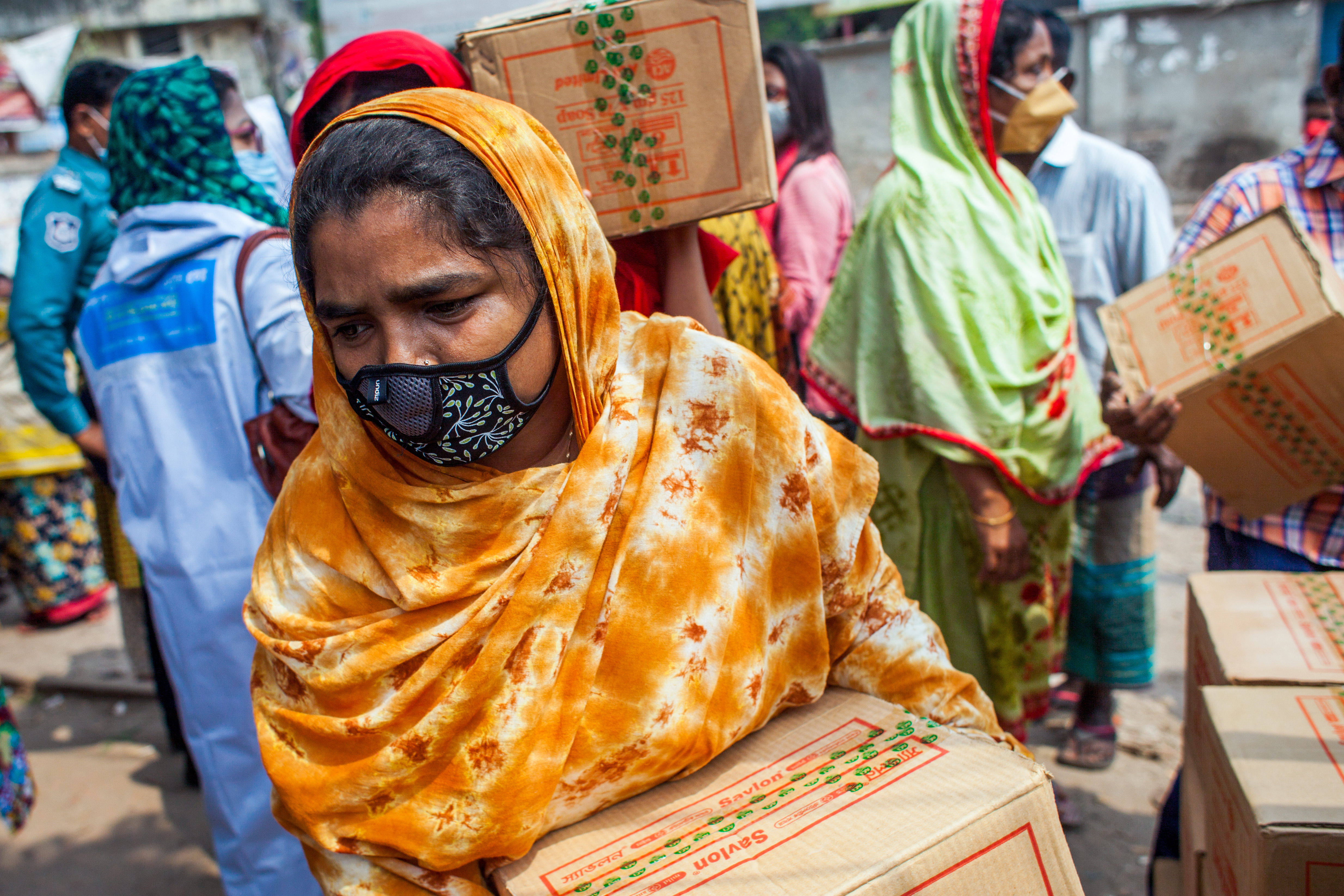Be Safe Until We Are Together Again
Photo: UNDP Bangladesh/Fahad Kaizer.
By Keizo Takemi and Achim Steiner
Near a twelvemonth ago, nosotros witnessed the first recorded cases of COVID-19. Since then the virus has devastated communities, systems and economies. For much of the world, and particularly vulnerable populations, these past 12 months have been filled with insecurity and hardship. Driven by the mutual goal of ending the worst pandemic in a century, at that place has been unprecedented collaboration between scientists to develop effective COVID-nineteen vaccines and treatments.
But innovations must be matched with commensurate investments and swift activeness to strengthen the systems needed to whorl out safe and constructive vaccines worldwide to billions of people. Without major investment in readiness, distribution and equitable admission, COVID-19 vaccines and therapeutics will remain out of accomplish for far besides many people, particularly in communities already struggling to cope with the touch on of the pandemic.
There have been promising signs of the kind of leadership necessary for an effective response.
Widespread cooperation around COVAX — a multilateral effort bringing together more 180 countries to bulldoze equitable access to successful COVID-nineteen vaccine candidates — and The Access to COVID-19 Tools (ACT) Accelerator — a global collaboration to accelerate development, production, and equitable access to COVID-xix tests, treatments and vaccines — illustrates that many acknowledge the need for solidarity in building a coordinated, global response. Meanwhile, some countries, similar Nippon, have already taken significant steps toward preparing the national systems necessary to provide gratuitous COVID-nineteen vaccinations to all, prioritizing the needs of the vulnerable and underserved. Many low- and centre-income countries, even so, where COVID-19 has caused fifty-fifty farther strain on health systems, practice not accept the capacity to human action similarly.
A synchronized international endeavour is needed.
The U.Due north. secretary-general recently noted that ending the global pandemic will require sustained investment in health systems and a renewed commitment to universal health coverage, calling on countries to guarantee that health care technologies are accessible and affordable to all who need them.
We have seen how weak health systems tin hinder a pandemic response.
The 2018 Ebola outbreak in the Democratic Republic of Congo proved difficult to end even as multiple vaccines were deployed alongside other public health tools due to ongoing conflict, vaccine hesitancy and underdeveloped health systems. We wrote that ensuring fair admission to health care would give the earth a real chance to "terminate the adjacent mortiferous disease outbreak before it occurs" several months before the first recorded cases of COVID-xix in 2019.
The continued spread of COVID-19 and exposure of our weak health systems clearly indicates that the world came up brusk. Only there is still time to ensure that we can deliver vaccines and therapeutics to the communities in need, and that those communities are ready to receive them.
Countries such as Nihon, with a tradition of universal health coverage and rigorous focus on health systems innovation, provide a road map of how we must work together to make equitable global vaccine readiness a reality. The regime of Japan partners with the Un Development Programme (UNDP) in 2 complementary initiatives critical to universal wellness coverage: promoting inquiry and evolution for unmet health needs and facilitating access to and delivery of medicines, diagnostics and vaccines.
The Global Health Innovative Applied science Fund (GHIT) is a public-individual partnership that works to accelerate the discovery and development of health technologies for neglected tropical diseases, tuberculosis and malaria. The Access and Delivery Partnership (ADP) complements this work past bringing together the World Health System, the Special Plan for Enquiry and Training in Tropical Diseases and PATH to help low- and middle-income countries strengthen their health systems and then that health technologies accomplish the people who need them.
Together, GHIT and ADP demonstrate that by investing in both research and development and health systems, we can drive faster progress on equitable admission to care, end the COVID-xix pandemic and gear up for future health emergencies. Loftier-income countries — like Nippon — must come up together to increase support for innovative collaborations such equally GHIT, ADP and COVAX and then that all countries can sally from this pandemic safer and stronger than before.
In that location is both a man and an economic imperative: A recent study projected that unequal global distribution of COVID-19 vaccines could cost the earth economy upwardly to $1.2 trillion. Countries must come up together and avoid the temptation of "vaccine nationalism," considering the wellness of people and the economy volition not be safe until everyone, everywhere has access to the tools necessary to end this pandemic.
New technological advancements are crucial to curbing the spread of COVID-nineteen, but they are not a silver bullet. Wellness, development and human security the world over will exist at cracking risk if communities practise non have timely admission to both new innovations and strong health systems capable of delivering them equitably. Universal wellness coverage is besides crucial for addressing inequality. Investing in stronger health systems and accelerating progress toward universal health coverage through domestic efforts and global cooperation volition ensure bridging the gap between the rich and the poor, every bit well as smoother and more than equitable distribution of health technologies, while helping to protect anybody through the pandemic and beyond.
Keizo Takemi is a member of Japan's Upper House and is the Earth Health Arrangement goodwill ambassador for universal health coverage. Achim Steiner is ambassador of the United nations Development Programme.
This article was originally published in the Japan Times.
hornerachargeturry.blogspot.com
Source: https://www.undp.org/asia-pacific/blog/covid-19-nobody-safe-until-everyone-safe

0 Response to "Be Safe Until We Are Together Again"
Enregistrer un commentaire